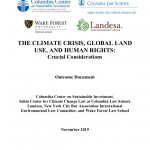Regional Consultation for the Americas on International Investment Agreements and Human Rights to support the UN Working Group on Business and Human Rights
Date: February 24, 2021, 9:00am-11:00am
Location: Online
Date: February 24, 2021, 9:00am-11:00am
Location: Online
In July 2020, CCSI made a formal submission to Bonsucro, an international multi-stakeholder initiative and certification scheme concerned with promoting sustainable sugar cane production. The submission formed part of consultations for Bonsucro’s draft Production Standard version 5. CCSI’s submission focused on challenges associated with implementing, and auditing for compliance with, three aspects of Bonsucro’s draft standard,… read more
Investment approval processes are the gateway through which governments set the agenda for their country’s investment environment. Yet too often these processes fail to incorporate meaningful requirements regarding participation in decision-making by Indigenous and other affected communities, increasing the risk of under-performing and conflict-ridden investments. This briefing will explain how host governments can incorporate FPIC and meaningful consultation into each stage of the investment approval process.

By Lise Johnson
January 14, 2020
The issue of investor responsibilities in investment law is – and should be — gaining prominence. Questions regarding whether and how investor responsibilities are, could, and should, be incorporated into or otherwise interact with international investment law and international investment agreements (IIAs) are a crucial part of the conversation regarding international investment law and policy, and reform thereof.

By Jesse Coleman
January 14, 2020
Can the investment regime be used to enhanced access to remedy and corporate accountability for human rights abuses in the context of international investment? If so, how?

By Brooke Skartvedt Güven
January 3, 2020
Investor-state mediation is a mechanism that is increasingly considered as a way to resolve disputes between companies and their host-country governments. Mediation merits exploration precisely because it can be adapted by the parties to the circumstances of any particular investment-related issue and be used to support mutually-beneficial outcomes. In this way, its malleability should be viewed as a tool that, if properly used, could overcome the failures of the investor-state dispute settlement (ISDS) system evidenced by the current “legitimacy crisis” that ISDS faces. However, to the extent mediation’s flexibilities are used to facilitate processes or outcomes that sideline domestic legal processes, third-party rights and interests, and norms of democratic accountability and the rule of law, it will undoubtedly meet the same fate as ISDS.
By Lisa Sachs, Ella Merrill, and Lise Johnson
December 9, 2019
Our planet faces unprecedented threats, including irreversible global warming, loss in biodiversity, and water pollution and water scarcity. The impacts of these environmental crises also threaten human rights and exacerbate inequality. Slowing these worsening environmental trends – and addressing the impacts of environmental change on populations – will require cumulative policy responses at the national and international level.
Date: November 21, 2019
Location: Webinar
Legal frameworks, and how they interact, are often invisible in the day to day. Yet they are powerful forces that influence government actions and that help to shape who benefits and who loses from foreign investment. Understanding these legal frameworks, and how they interact, is critical for anyone concerned with how foreign investment can be… read more

On September 27th, the Columbia Center on Sustainable Investment (CCSI), the Sabin Center for Climate Change Law, Landesa, the New York City Bar Association International Environmental Law Committee, and Wake Forest Law School hosted a day-long conference on the intersection between land use, the climate crisis and clean energy transition, and human rights. Held at… read more